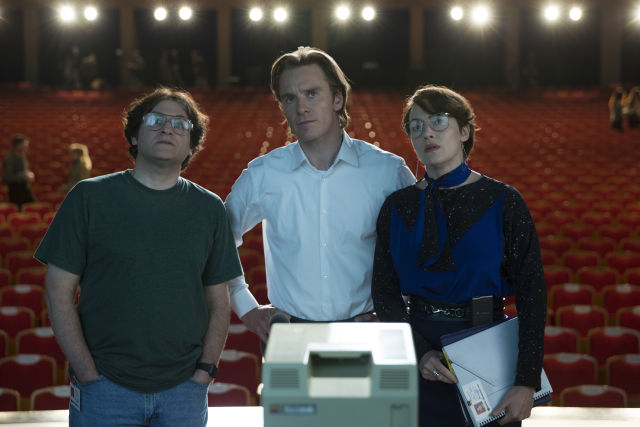Steve Jobs premiered Friday night (10/9/15) in four theaters throughout Los Angeles and New York, taking in roughly $130,000 per theater. Screenwriter Aaron Sorkin, who wrote The Social Network about Mark Zuckerberg and Facebook, and director Danny Boyle, who directed “Slumdog Millionaire,” say they never intended to do a biopic of Apple’s co-founder from “cradle to grave,” but rather an Impressionistic “painting” of Jobs. And that, they did.

Filmmakers often sacrifice historic accuracy for the sake of the story, and Steve Jobs is no exception. The film consists of conversations and events that didn’t actually happen, leaving Sorkin and Boyle with several questions from the audience, especially from those who knew Jobs. Many defended Jobs, saying journalists who followed the company “have an obligation to be objective. I have an obligation to be subjective.”
The story Sorkin and Boyle tell is about an impatient, uncompromising man who used and dismissed people as he furthered himself to take on the world. What the filmmakers fail to tell us is why Jobs felt he was he was the one to change the world and how he went about doing so.
Their storytelling approach takes the audience behind-the-scenes as Jobs, known for creating a cult of secrecy at Apple, prepares to introduce three important products to the world: the Mac, NeXT workstation, and iMac computer. But instead of watching Jobs launch these products, Sorkin and Doyle present a pragmatic history as to what was happening backstage.
Following the premier, Sorkin and Boyle did a Q&A and took questions from the audience. Sorkin addressed the issue of covering a well-known person like Jobs, saying that he didn’t believe any of the scenes created did harm to the image of Jobs or to the people represented in the film who are still alive. When Sorkin was asked what Jobs might think about the film if he were alive today, Sorkin responded, “If this movie were about someone else, he’d like it.”
Despite how he believes the famed CEO would react, Sorkin ultimately sides with his depiction of the title character. The movie suggests that Apple computers are a form of art and that Steve Jobs himself is an artist who should be celebrated.
Steve Jobs is currently in select theaters with a wide release scheduled for Friday, October 23, 2015.
Via CNet
Advertisement
Learn more about Electronic Products Magazine





